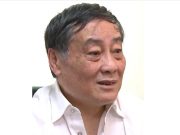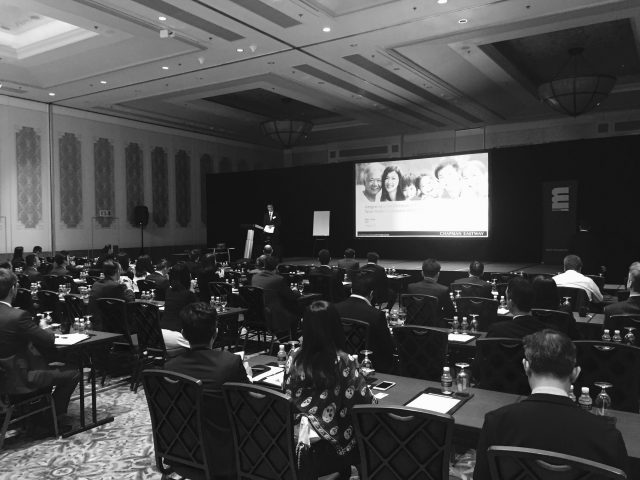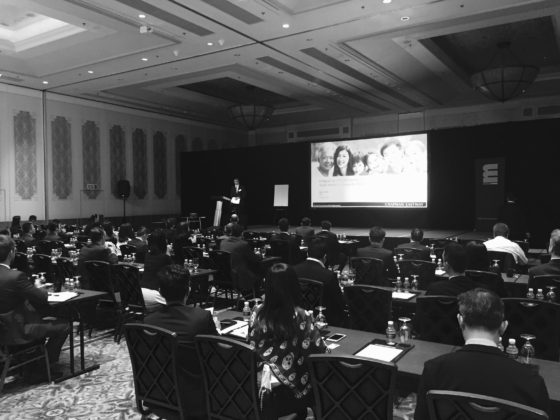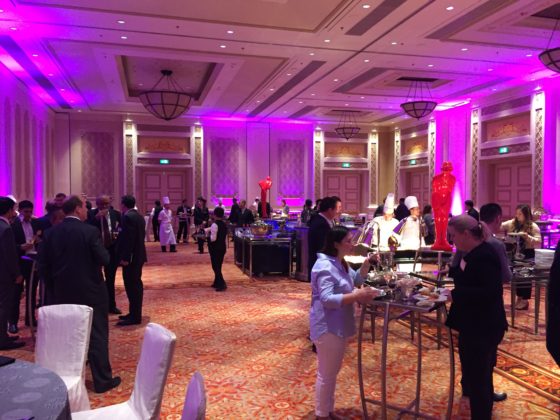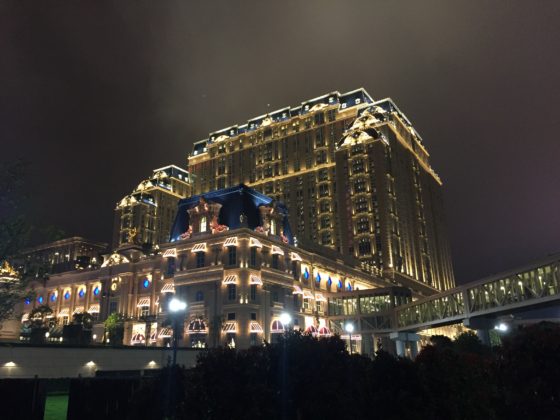Highlights from the Private Wealth Management APAC Summit April 2017 in Macau
Macau | 12th April 2017
Some of Asia’s most discrete and leading family offices gathered in Asia’s premier entertainment city, Macau for the Private Wealth Management APAC Summit 2017 in a 3 days bespoke conference.
Together with leading global investment managers and consultants, the event’s distinguished Chairman Sean Cortis, Principal & CEO of Chapman Eastway, opened the conference with a keynote presentation.
Day 1
A Flexible Family Office Structure for HNW Families
In his opening keynote, he asked:” How many believe (people) want flexibility?” The response from the audience was overwhelmingly positive.
“We provide an architect for family office – we don’t do Wealth Management.”
He emphasised how families want flexibility and cited an example of what his firm does, “We provide an architect for family office – we don’t do wealth management.” But Sean Cortis also clarified that in creating an (ideal) environment for family office, there has to be a balance between flexibility and order.
He described another difficulty in advising clients, a common issue with many advisors. A couple of months ago, he had a conversation with an Australian billionaire and thought it is a great time to start a family office for him.
- Sean Cortis: “What is the wealth for?
- The Australian Billionaire: “I haven’t really thought about it”
He pointed some global issues that the industry is facing today – the global shift towards tax-compliant structures (as more complex regulations and policies raise difficulties in implementing structures). “We need to think about structures that protect the capital,” he said.
In another illustration, he asked:”How many of you think investing is safer than flying? (And) how many of you think flying is safer than investing?
He continued:”On flying, you get to enjoy dining and entertainment. You have flexibility. You don’t have to interview the pilot. You trust the pilot. You trust the international standards. You trust the process. In investing & designing a family office, there has to be a process”
Challenges in Setting a Family Office
In a question by a family office on how the design of the family office will not be able to meet the viewpoints of the patriarch and the family members – and at any opportunity, someone will be looking to tear down he structure and re-design it. He replied:” (Almost) every family I talk to is dysfunctional.”
Another participant raised the difficulty in structuring the family office. The participant described how (although) Singapore should be an ideal center, but his two children might want to be in United States. And this is not up to him to decide. On the other hand, United States has become increasingly complicated (eg. green card, tax, processes, uncertainties). Which country would be the safer place? Should that be New Zealand?
China’s Family Office in 2014
In another presentation on “Creating Tailor made Portfolio Strategies of the Families based on their Individual Goal”, Kai Tian, President of Nautilus Family Office recalled the evolution of China’s Wealth Management Industry:
| Year | Development |
| 2007 | Private banking |
| 2008 | Independent Financial Advisory (IFA) |
| 2014 | Family Office |
“Great! You can help (me) to buy furnitures”
He recollected in early 2014 during the early development of Family Offices, what a Family Office meant to Chinese clients then.
The client(s) response was:”Great! You can help (me) to buy furnitures”
Day 2
Family and Philanthropy
“It is not what you reap today, but the seeds you planted”
“It is not what you reap today, but the seeds you planted,” Yvette Yeh Fung, Chairperson & Director of The Yeh Family Philanthropy passionately began her talk on “Investing in the Future.”
She (herself) is not a numbers person (lawyer), and not into investments. Relating to her family, her brother is the co-founder of an investment firm – and she needs her brother to generate the returns so that (she and on behalf of the Yeh family) can pursue philanthropy goals. “In other words, spend it,” she said.
In sharing her family story, her grandfather tasked her to setup a family foundation instead of a family office. She explained further:” He didn’t want the family to be forced together, because of investments. He wanted the family to get together because of values.”
“What I’m standing here in appreciation of, (with my grandfather having just passed), is the gift of inheriting a philanthropy.”
Sharing the values of The Rockefeller Foundation (reknown for Philanthropy & Humanity causes), “they won the genetic lottery. They want to share the good fortune,” she said.
Their foundation, The Yeh Family Philanthropy, was set up with more external directors (3) than Yeh Family Members (2) to maintain independence and objectivity. They also put up their (audited) financial statements on their website.
“she needs her brother to generate the returns so that she can pursue philanthropy goals. ~ In other words, spend it!”
Where are the money and returns to sustain philanthropy causes? The presentation shifted from creating social impact to investing.
Investment Opportunities: PIPEs
Philippe Fröhlicher of FGP Capital introduced PIPEs:”Targeting at 8% – 15% returns with low volatility.” PIPEs or Private Investments into Public Equity is a relatively lesser known investment option in Asia. He shared how PIPEs are becoming part of smart portfolio construction. And “there is no leverage at anytime,” he said.
Their deal source originates from investment banks, lawyers, scientists and conferences. FGP Capital employs a rigiourous approach, disciplined and structured process. Out of every 4 deals, they reject almost 3 deals.
Real Estate: Never a Doubt in Asia, for Asian Families
Executive Director of Hadley Green Investment Group, Hugh Zochling presented one of hottest topic in Asia: “Mega Trends and the Decade ahead for Real Estate Investing.”
He mentioned the strategy is to avoid investing in specialised market, unless partnering and co-investing. “You want them (investment partners) to put their money where their mouth is,” he emphasised.
“Real estate is still the best place for long-term wealth generation and preservation.”
“Real estate is still the best place for long-term wealth generation and preservation,” and he shared 6 specific real estate sectors that are likely to generate double digit returns:
- Seniors / Aged accommodation
- Student accommodation
- Healthcare
- Data Centers
- Agriculture
- Tourism
“Real estate have a different rule,” he said in his concluding remark to his presentation.
Real estate remained the hot topic in the Private Wealth Management APAC Summit 2017.
In a panel discussion on establishing a strong real estate portfolio through geographical diversification, Phllippe Legrand, CEO of London & Capital Asia highlighted that “one of the value of real estate is the holding power.”
Elaine Chow, Founder & CEO, Trinity Capital described one of the way they gather better information,” It is good to join real estate and club investing group, where you get market intelligence and that is how you can (might) get the cheapest financing terms.”
She elaborated further on their UK real estate strategy, on how they could hedge currency risk though local financing, and where they could get a really good rate (eg. lower interest rate, and better rates via “intelligence” from the club investing group).
“We are not professionals. We are investment managers.
“We are not professionals. We are investment managers. So we try to get views of the experts, such as the banks,” she emphasised.
Phllippe Legrand, CEO of London & Capital Asia expressed his views on real estate risks:”Sadly, most people view real estate as an asset class. They own a property and they make money. (But) They don’t know the rules of the game. There are factors such as currency risks and political changes. If you are serious about real estate, due diligence is the key.”
Simon Mar, Founder & CEO of Hwa Family Office was asked to share his thoughts on real estate tax and risks in China:”It doesn’t matter where you buy, anywhere you want to buy.” He also illustrated “different ways you can do it.”
His final remark:”Structure! How do you buy it … … is more important than the location.”
In the final moments of the panel discussion, Phllippe Legrand, CEO, London & Capital Asia shared an interesting insight into investing into football clubs.
“When they buy into a football club, they are trying to raise the value of the football club (eg. redeveloping the training ground). (And) The area gets developed, and so there is a real estate angle to the (football club) investment.
From investments and real estate, the day went onto what might really matters most to the wealthiest families – legacy and succession.
Creating Legacy and Succession
Dr Amen Lee, President of the Legacy Academy started and perhaps startled his audience by quoting “Wealth does not pass three generations,” and subsequently unveil the disastrous succession statistics :
” Only 3 % of Enterprises pass on from 3rd to 4th generation “
| Wealth Transfer | Success Rate |
| 1st to 2nd Generation | 30% |
| 2nd to 3rd Generation | 12% |
| 3rd to 4th Generation | 3% |
Source: Family Firm Institute Inc.
In his presentation on “Integrating a Holistic Wealth Legacy Succession to Enable a Smooth Transition to the Next Generation,” he cited a study from John L. Ward in 2011 on why founders want the next generation to continue their businesses:
- 34% – Pass on opportunity to children
- 21% – build heritage traditions & roots
- 15% – keep family together
- 10% – generate financial advantages & wealth
About John L. Ward
John Ward is a co-founder of The Family Business Consulting Group and consultant emeritus. He is currently co-director of The Center for Family Enterprises at Northwestern University’s Kellogg School of Management where he is Clinical Professor of Family Enterprises. John teaches and studies family enterprise continuity, ownership, governance and philanthropy.John graduated from Northwestern University (B.A.) and Stanford Graduate School of Business (M.B.A. and Ph.D.)
Admittedly “Wealth is important to achieve the top 3 goals,” said Dr Amen Lee and “Japan has the most successful transition to the next generation.”
Enterprises’ Sustainability in Japan:
| No. of Years | No. of Enterprises |
| Exceeding 100 Years (In Japan)* | 20,304 |
| Exceeding 200 Years (In China) | Less than 10 |
| Exceeding 200 Years (In Japan)* | 1,241 |
| Exceeding 500 Years (In Japan)* | 34 |
Source: Japan Teikoku Databank*
“Identify the DNA of family success from its family history,” said Dr Amen Lee as he elaborated further on how implementing the 3 Cs: Culture, Council and Constitution, are keys to a successful transition to the next generation.
“It is not about business moving forward … … They work very hard when they first started their business. They work hard for their family. But as they focus on their business, they forget about why they start the business – (for the family) … … and family dispute about wealth is superficial.”
” It is hard for them to change their habits. And they are also getting older and older “
When quizzed about the challenges trying to get the businessman to focus on their family, he explained with ease:”Businessmen work everyday 7am to 9pm in the office, and for 30 years. It is hard for them to change their habits. And they are also getting older and older.”
- They work hard for 30 years
- Hard for them to change their habits
- They are getting older and older
He summed up by giving a quote:”The best timing to plant a tree is 20 years ago. The second best timing is now.”
In the following presentation on “Creating a Legacy in an Evolving World – Guiding Asian Families through Wealth Transition,” Britta Pfizer, Head of Wealth Planning Asia Pacific of Rothschild Trust provided a comprehensive overview on the current situation, the realities and family wealth and assets solutions.
Soon after her presentation, she was quickly asked for her professional opinion for an ideal solution (on setting up a trust or wealth structure) :” Is there any preference for any jurisdiction?”
She cited the “Common Reporting Standard (CRS)” have levelled the playing-field. Many jurisdictions (popular jurisdictions such as Cayman, Bermuda, Singapore) have already signed up. There is now increased transparency.
Still, “there is another layer of confidentiality within the family. You may not want them to know what is available for them,” explaining why the benefits of trust and wealth structures remain important.
“The choice of jurisdiction, and confidentiality are less of a decision today”
“The choice of jurisdiction, and confidentiality are less of a decision today. There is also a limit of the lifespan of the trust (80 years, 100 years etc),” she said in closing her presentation.
Passion Can Be Profitable
In perhaps the most passionate talk over the 3 days bespoke Private Wealth Management event, Executive Director of Wen Ken Group, Cheong Wing Kiat shared his unique perspective on how a “Labour of Love can turn into a Profitable Investment.”
In his talk on “Passion and High Returns” – he shared experiences of how helping an artist to kickstart his business and, in another investment, investing into gems had turned out to be profitable investments.
He didn’t invest into the business, but (investing) into the people and their passion.
He was approached to be the patron of an art business and thereby, funded the business. This allowed the artist to quit his professional job to pursue his passion – painting.
- Mr Cheong loves painting
- He created a business structure to co-share profits with the artist
- Unsold paintings will be sold to Mr Cheong at a lower price
The business broke even in 5 years.
Mr Cheong described in an exchange during one of the art exhibition:”The artist’s wife went up to him and thank him profusely for funding her husband’s business and being able to quit his job to pursue his passion. During that exhibition, they gave him a cheque (profits). He felt so embarrassed, as he had not only recovered his capital, and also collected numerous paintings.”
Cheong Wing Kiat was a corporate accountant, venture capitalist and management consultant. In 1995, he became the 3rd generation business leader (1995 – 2011) of Wen Ken Group, one of the largest Traditional Chinese Medicine (TCM) Group in Southeast Asia. Wen Ken Group is a multi-family business founded in 1937. He is the founder of Business Concept Pte Ltd (1990), advising (including family businesses) and investing into businesses.
He shared how UHNW calculate RATE of Return:
- Return on Investment
- Alignment of Objectives
- Time on Personal Involvement
- Emotion in the Investment
“Someone has to pay the school fees, and he may not want the children to do it in the family business”
In one of his last messages, he talked about one of the most common issue faced by a family business owner:”He might want the children to learn. (But) Someone has to pay the school fees, and he may not want the children to do it in the family business.”
Day 3
Rethinking: Wealth and Families
Ruth Guo, Manager of Beijing Freeland Family Office in the final presentation on Day 3 of the summit, quoted one of the most tragic story in China.
Wang Jun Yao, a self-made billionaire (today’s value) had died at the age of 38 years old on 7th November 2004 due to overwork, after suffering from intestinal cancer.
History
Wang Jun Yao reportedly left 1.9 billion yuan (US$280mn) to his wife, who married her husband’s driver. The driver was quoted saying:”I did not realize that my boss had always been working for me!”“以前,我以为自己是在为老板打工,现在我才明白老板一直在为我打工!”
In her presentation on “Current Asset Protection Challenges in the Chinese Market,” she aptly demonstrated why many of the leading family offices, investment managers and consultants spent 3 precious days at the Private Wealth Management Summit 2017 in Macau: “The average age is 58 of HNWI in China. It is time to talk about retirement.”
“The average age is 58 of HNWI in China. It is time to talk about retirement”
Distinguished Chairman of the 2017 Private Wealth Management Summit, Sean Cortis, Principal & CEO of Chapman Eastway, in his closing remarks, rounded up almost every single speakers’ messages over the 3 days.
The exemplary conduct of every speaker and participant, perhaps reinforce why much of the world’s wealth are in their hands.
Not only do they focus on creating mega-business opportunities and investing into unchartered territories, they focus on creating positive social impact and values, evaluating issues that spans generations, focus on sustainability and navigating complex global political and economic environment.
Their biggest impact? Their families and businesses hire millions of people around the world, relying on their vision that creates countless of opportunities, products, services, jobs and income that feed countless of families.
Ironically, they work so hard, sometimes they forget their family.
And with the aftermath of the event, the 3 days summit is profoundly embodied in the following message, quoted at the very beginning of the event.
“I haven’t really thought about it”
- Sean Cortis: “What is the wealth for?
- The Australian Billionaire: “I haven’t really thought about it”
The Private Wealth Management APAC Summit took place at the Conrad Macao, Cotai Central, Macao on 10 – 12 April 2017. The event is organised by Marcus Evans.
By Caproasia Online Editorial Team
Sign Up / Register
Caproasia Users
- Manage $20 million to $3 billion of assets
- Invest $3 million to $300 million
- Advise institutions, billionaires, UHNWs & HNWs
Caproasia Platforms | 11,000 Investors & Advisors
- Caproasia.com
- Caproasia Access
- Caproasia Events
- The Financial Centre | Find Services
- Membership
- Family Office Circle
- Professional Investor Circle
- Investor Relations Network
Monthly Roundtable & Networking
Family Office Programs
The 2025 Investment Day
- March - Hong Kong
- March - Singapore
- July - Hong Kong
- July - Singapore
- Sept- Hong Kong
- Sept - Singapore
- Oct- Hong Kong
- Nov - Singapore
- Visit: The Investment Day | Register: Click here
Caproasia Summits
- The Institutional Investor Summit
- The Investment / Alternatives Summit
- The Private Wealth Summit
- The Family Office Summit
- The CEO & Entrepreneur Summit
- The Capital Markets Summit
- The ESG / Sustainable Investment Summit





